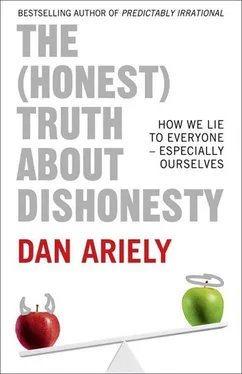Ariely, Dan - The (Honest) Truth About Dishonesty - How We Lie to Everyone – Especially Ourselves
Здесь есть возможность читать онлайн «Ariely, Dan - The (Honest) Truth About Dishonesty - How We Lie to Everyone – Especially Ourselves» весь текст электронной книги совершенно бесплатно (целиком полную версию без сокращений). В некоторых случаях можно слушать аудио, скачать через торрент в формате fb2 и присутствует краткое содержание. Жанр: Старинная литература, на английском языке. Описание произведения, (предисловие) а так же отзывы посетителей доступны на портале библиотеки ЛибКат.
- Название:The (Honest) Truth About Dishonesty: How We Lie to Everyone – Especially Ourselves
- Автор:
- Жанр:
- Год:неизвестен
- ISBN:нет данных
- Рейтинг книги:4 / 5. Голосов: 1
-
Избранное:Добавить в избранное
- Отзывы:
-
Ваша оценка:
- 80
- 1
- 2
- 3
- 4
- 5
The (Honest) Truth About Dishonesty: How We Lie to Everyone – Especially Ourselves: краткое содержание, описание и аннотация
Предлагаем к чтению аннотацию, описание, краткое содержание или предисловие (зависит от того, что написал сам автор книги «The (Honest) Truth About Dishonesty: How We Lie to Everyone – Especially Ourselves»). Если вы не нашли необходимую информацию о книге — напишите в комментариях, мы постараемся отыскать её.
The (Honest) Truth About Dishonesty: How We Lie to Everyone – Especially Ourselves — читать онлайн бесплатно полную книгу (весь текст) целиком
Ниже представлен текст книги, разбитый по страницам. Система сохранения места последней прочитанной страницы, позволяет с удобством читать онлайн бесплатно книгу «The (Honest) Truth About Dishonesty: How We Lie to Everyone – Especially Ourselves», без необходимости каждый раз заново искать на чём Вы остановились. Поставьте закладку, и сможете в любой момент перейти на страницу, на которой закончили чтение.
Интервал:
Закладка:
If you think about this type of cheating in the context of the “what-the-hell” effect, it might be that fake academic credentials often start innocently enough, perhaps along the lines of “fake it till you make it,” but once one such act has been established, it can bring about a looser moral standard and a higher tendency to cheat elsewhere. For example, if an executive holding a fake graduate degree puts constant reminders of his fake degree on his letterhead, business cards, résumé, and website, it’s not much of a stretch to imagine that he could also start cheating on expense reports, misrepresenting billable hours, or misusing corporate funds. After all, given the what-the-hell effect, it is possible that one initial act of cheating could increase the executive’s general level of self-signaled dishonesty, increasing his fudge factor, which would give rise to further fraud.
THE BOTTOM LINEis that we should not view a single act of dishonesty as just one petty act. We tend to forgive people for their first offense with the idea that it is just the first time and everyone makes mistakes. And although this may be true, we should also realize that the first act of dishonesty might be particularly important in shaping the way a person looks at himself and his actions from that point on—and because of that, the first dishonest act is the most important one to prevent. That is why it is important to cut down on the number of seemingly innocuous singular acts of dishonesty. If we do, society might become more honest and less corrupt over time (for more on this, see chapter 8, “Cheating as an Infection”).
(DON’T) STEAL THIS BOOK
Finally, no discussion of designer counterfeits could be complete without mentioning their cousin, illegal downloading. (Imagine experiments similar to the ones on fake sunglasses but using illegally downloaded music or movies.) Allow me to share a story about a time when I learned something interesting about illegal downloads. In this particular case, I was the victim. A few months after Predictably Irrational was published, I received the following e-mail:
Dear Mr. Ariely,
I just finished listening to the illegally downloaded version of your audio book this morning, and I wanted to tell you how much I appreciated it.
I am a 30-year-old African American male from the inner city of Chicago, and for the last five years, I have been making my living by illegally selling CDs and DVDs. I am the only person in my family who is not in prison or homeless. As the last survivor of a family that represents all that is wrong with America, and as someone breaking the law today, I know it is only a matter of time before I join my family in prison.
Some time ago I got a 9-to-5 job, and was excited at the idea of starting a respectable life, but soon after I started, I quit and went back to my illegal business. This is because of the pain I felt at giving up my illegal business that I had built and nurtured for five years. I owned it, and I couldn’t find a job that gave me the same feeling of ownership. Needless to say, I could really relate to your research on ownership.
But something else was equally important in pushing me back to the illegal retail business. In the legal retail store where I worked, people often talked about loyalty and care for their customers, but I don’t think they understood what this means. In the illegal industry, loyalty and care are much stronger and more intense than anything I encountered in legal retail. Over the years I have built a network of about 100 people who kindly buy from me. We have become real friends with real connections and developed a level of deep care for one another. These connections and friendships with my clients made it very hard for me to give up the business and their friendship in the process.
I’m happy that I listened to your book.
Elijah
After receiving this e-mail from Elijah, I searched the Internet and found a few free downloadable versions of my audiobook and a few scanned copies of the printed version (which, I have to admit, were high-quality scans, including the front and back covers, all the credits and references, and even the copyright notices, which I particularly appreciated).
No matter where you stand on the “information wants to be free” ideological spectrum, seeing your own work distributed for free without permission makes the whole issue of illegal downloads feel a bit more personal, less abstract, and more complex. On the one hand, I’m very happy that people are reading about my research and hopefully benefitting from it. The more the merrier—after all, that is why I write. On the other hand, I also understand the annoyance of those whose work is being illegally copied and sold. Thankfully I have a day job, but I am certain that if I were to rely on writing as my main source of income, illegal downloads would be less of an intellectual curiosity and much more difficult to swallow.
As for Elijah, I think we made a fair exchange. Sure, he illegally copied my audiobook (and made some money in the process), but I learned something interesting about loyalty and care for customers in the illegal industry and even got an idea for possible future research.
WITH ALL OFthis in mind, how can we fight our own moral deterioration, the what-the-hell effect, and the potential of one transgressive act to result in long-term negative effects on our morality? Whether we deal with fashion or other domains of life, it should be clear that one immoral act can make another more likely and that immoral acts in one domain can influence our morality in other domains. That being the case, we should focus on early signs of dishonest behaviors and do our best to cut them down in their budding stages before they reach full bloom.
AND WHAT ABOUTthe Prada bag that started this whole research project? I made the only possible rational decision: I gave it to my mother.
CHAPTER 6
Cheating Ourselves
Imagine yourself on a soft, sandy beach. The tide is rolling out, creating a wide swath of wet sand for you to wander along. You’re heading to the place where you go from time to time to check out girls. Oh, and you’re a feisty blue crab. And in reality, you’re going to spar with a few other male crabs to see who will win the favor of the females.
Ahead you see a pretty little thing with cute claws. At the same time, you notice that your competition is quickly closing in. You know that the ideal way to handle the situation is to scare off the other crabs. That way you don’t have to get into a fight and risk hurting yourself or, worse, lose your chance to mate. So you have to convince the other crabs that you’re bigger and stronger. As you inch closer to your competition, you know you need to emphasize your size. However, if you simply pretend to be larger by standing on your toes and halfheartedly waving your claws around, you will probably give yourself away. What to do?
What you need to do is give yourself a pep talk and start believing that you are, in fact, bigger and tougher than you really are. “Knowing” you’re the biggest crab on the beach, you stand as high as you can on your hind legs and spread your claws as far and high above you as possible (antlers, peacock tails, and general puffing up help other male creatures do the same thing). Believing in your own fabrication means that you will not flinch. And your (exaggerated) self-confidence might cow your opponents.
NOW BACK TOus. As humans, we have slightly more sophisticated means of puffing ourselves up than our animal counterparts. We have the ability to lie—not just to others but also to ourselves. Self-deception is a useful strategy for believing the stories we tell, and if we are successful, it becomes less likely that we will flinch and accidentally signal that we’re anything other than what we pretend to be. I’m hardly endorsing lying as a means of attaining a partner, a job, or anything else. But in this chapter, we’ll look at the ways we succeed in fooling ourselves as we try to fool others.
Читать дальшеИнтервал:
Закладка:
Похожие книги на «The (Honest) Truth About Dishonesty: How We Lie to Everyone – Especially Ourselves»
Представляем Вашему вниманию похожие книги на «The (Honest) Truth About Dishonesty: How We Lie to Everyone – Especially Ourselves» списком для выбора. Мы отобрали схожую по названию и смыслу литературу в надежде предоставить читателям больше вариантов отыскать новые, интересные, ещё непрочитанные произведения.
Обсуждение, отзывы о книге «The (Honest) Truth About Dishonesty: How We Lie to Everyone – Especially Ourselves» и просто собственные мнения читателей. Оставьте ваши комментарии, напишите, что Вы думаете о произведении, его смысле или главных героях. Укажите что конкретно понравилось, а что нет, и почему Вы так считаете.












